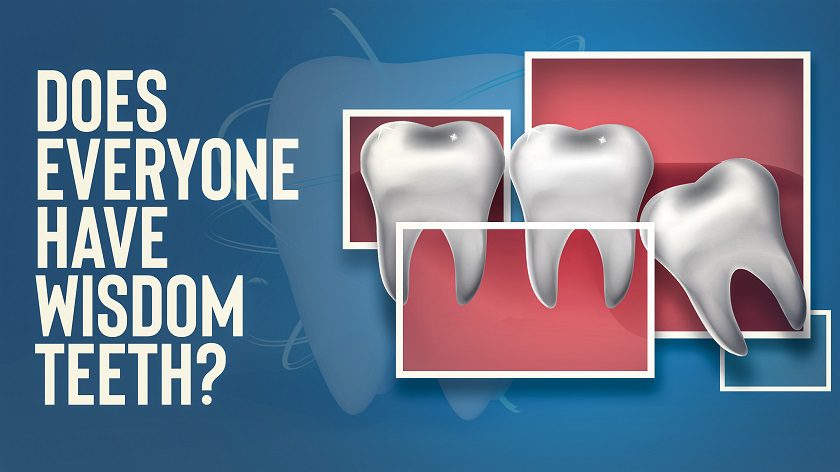When it comes to dental matters, one topic that often arises is wisdom teeth. These are the third set of molars located at the back of the mouth and are the last to come in, usually during early adulthood. Wisdom teeth have sparked curiosity and concern among many people, wondering whether everyone has them and what purpose they serve. In this article, we will take a look at wisdom teeth and if everyone has them.
The Origins of Wisdom Teeth
To understand wisdom teeth better, let’s take a trip back in time. From an evolutionary perspective, our ancient ancestors needed these extra molars to chew tough, uncooked foods like roots, nuts, and meats. Anthropological evidence suggests that early humans had larger jaws, which accommodated the full set of 32 teeth, including wisdom teeth. However, as humans evolved and diets changed over time, the need for these additional molars diminished.
The Growth and Development of Wisdom Teeth
The growth of wisdom teeth typically occurs during the late teenage years or early twenties. This stage is often referred to as “eruption.” However, the process is not always smooth. Various factors can influence how and when wisdom teeth emerge, including genetic predisposition, jaw size, and oral health. Dental X-rays play a crucial role in monitoring their development and assessing potential issues.
To Extract or Not to Extract
The decision to remove wisdom teeth is a common dilemma faced by many individuals. While some people experience no problems with their wisdom teeth, others may encounter issues such as impaction, overcrowding, or misalignment. In such cases, extraction becomes a viable option to prevent future complications. However, not all wisdom teeth need to be removed, and certain situations may call for a more conservative approach.
Impacted Wisdom Teeth
Impacted wisdom teeth occur when there is not enough space for them to fully emerge or develop properly. This condition can lead to various issues, including infections, cyst formation, and damage to adjacent teeth. Understanding the causes and risk factors associated with impacted wisdom teeth can help individuals take proactive measures to prevent or address these complications.
Wisdom Teeth Removal Procedure
For those who require wisdom tooth extraction, knowing what to expect during the procedure can ease anxiety. The typical procedure involves first consulting with a dentist or oral surgeon, making necessary pre-operative preparations, followed by the extraction itself under anesthesia, and concluding with post-operative care. Though oral surgery may seem intimidating, advancements in dental practices have made the process safer and more comfortable than ever before.
Recovery and Aftercare
A smooth recovery is essential after wisdom tooth extraction. Following post-operative instructions, such as proper oral hygiene, rest, and a soft food diet, can contribute to a quicker healing process. It’s normal to experience some swelling and discomfort during the recovery period, but knowing how to manage these symptoms effectively can make the healing journey more bearable.
The Pros and Cons of Keeping Wisdom Teeth
Despite the prevailing notion that all wisdom teeth should be extracted, there are situations where retaining them can be beneficial. These molars can aid in chewing certain foods, and their removal may not always be necessary. However, it’s crucial to weigh the potential advantages against the risks and individual circumstances before making a decision.
Frequently Asked Questions (FAQs)
- Can wisdom teeth cause crowding of other teeth?
Wisdom teeth can sometimes exert pressure on neighboring teeth, leading to crowding and misalignment.
- At what age do wisdom teeth typically erupt?
Wisdom teeth generally erupt between the ages of 17 and 25, though this can vary.
- What should I do if my wisdom teeth are coming in at an angle?
Angled wisdom teeth may require extraction if they pose a risk of impaction or other issues.
- Can wisdom teeth be useful for chewing?
In the past, wisdom teeth played a role in chewing tough foods, but with modern diets, they are less essential for this purpose.
Visit us at Bayswaters Dentist for Wisdom Teeth Extraction
Wisdom teeth remain an intriguing aspect of human dental development. While not everyone has wisdom teeth, those who do may face unique experiences and challenges. It needs a careful consideration to decide whether or not to keep wisdom teeth. It is best to visit your dentist for examination and professional advice. If you would like to know more about wisdom teeth, or you have any issue with your wisdom teeth, feel free to visit us at Bayswater Dentist.

